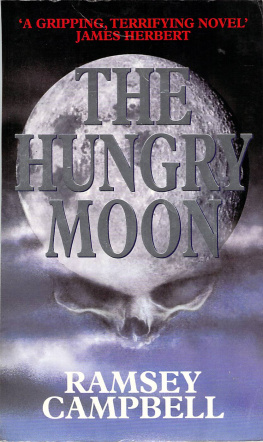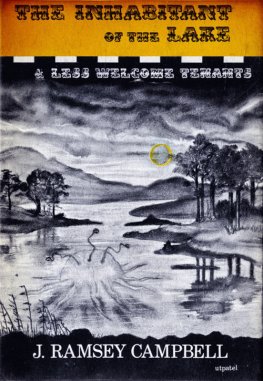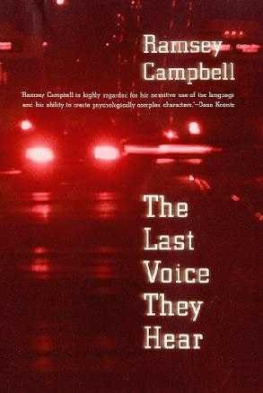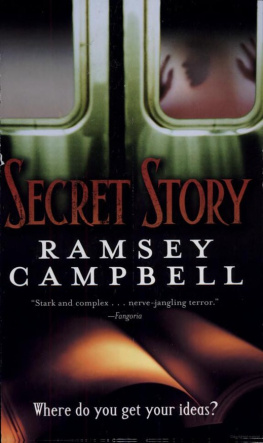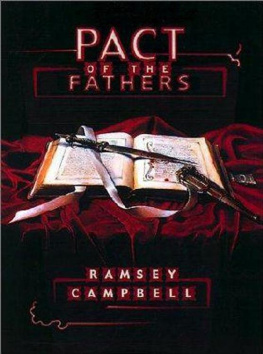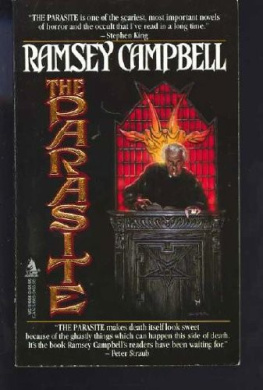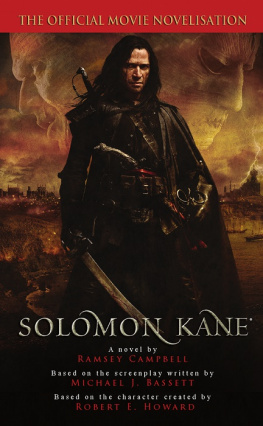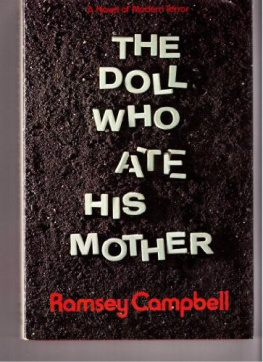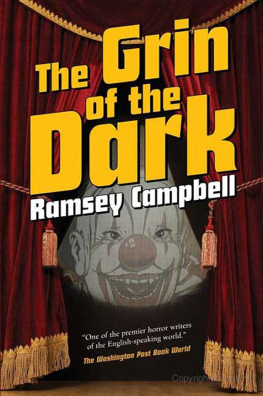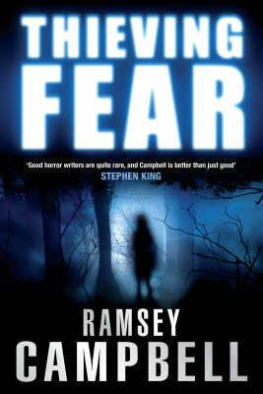Ramsey Campbell - The Hungry Moon
Here you can read online Ramsey Campbell - The Hungry Moon full text of the book (entire story) in english for free. Download pdf and epub, get meaning, cover and reviews about this ebook. year: 1987, publisher: Tor Books, genre: Detective and thriller. Description of the work, (preface) as well as reviews are available. Best literature library LitArk.com created for fans of good reading and offers a wide selection of genres:
Romance novel
Science fiction
Adventure
Detective
Science
History
Home and family
Prose
Art
Politics
Computer
Non-fiction
Religion
Business
Children
Humor
Choose a favorite category and find really read worthwhile books. Enjoy immersion in the world of imagination, feel the emotions of the characters or learn something new for yourself, make an fascinating discovery.
- Book:The Hungry Moon
- Author:
- Publisher:Tor Books
- Genre:
- Year:1987
- Rating:3 / 5
- Favourites:Add to favourites
- Your mark:
- 60
- 1
- 2
- 3
- 4
- 5
The Hungry Moon: summary, description and annotation
We offer to read an annotation, description, summary or preface (depends on what the author of the book "The Hungry Moon" wrote himself). If you haven't found the necessary information about the book — write in the comments, we will try to find it.
The Hungry Moon — read online for free the complete book (whole text) full work
Below is the text of the book, divided by pages. System saving the place of the last page read, allows you to conveniently read the book "The Hungry Moon" online for free, without having to search again every time where you left off. Put a bookmark, and you can go to the page where you finished reading at any time.
Font size:
Interval:
Bookmark:
'The human race has a terminal disease called sin.'
Billy Graham
'Go down Harry Moony, harry us no more, We've flowers to please you, to leave at your door.'
Old Derbyshire street song
'... sustolere monstra, quibus hominem occidere religiosissimum erat, mandi vero etiam saluberrimum...
Pliny the Elder, on the Druids
'... to fear the moon, to feed her as she must be fed, and never to look upon her feeding...'
Druidic triad quoted by Posidonius
Nick Reid stepped out of the newspaper building into the deserted Manchester street and wondered what the silence reminded him of. He took a cool breath of early morning air and stretched, wincing at the bruises he'd brought back with his report from the picketing. An unanswered phone rang in an office on Deansgate; a single car cruised past the department stores on Piccadilly, sending pigeons up from the roadway to wheel above the gable windows. Nick ran his fingers through his crinkly hair and tried to let the silence be itself. It couldn't be important to remember; he just wanted to wake up so as to drive home and sleep. He glanced up as sunlight snatched at the steep roofs through a gap in the clouds that were rushing a storm toward the Peaks. Memory seized him then, it felt as though by the scruff of his aching neck. 'Diana,' he gasped, and then he realized what else was wrong.
He limped into the building, across the lobby that turned his footsteps high-pitched, up the stairs to the library. The blank grey screens of microfilm readers gleamed dully under the tubular lighting of the small white room. He ought to call Diana - he couldn't even remember how long it had been - but surely there was no need to wake her up. He began to leaf through the file of the last few weeks' issues, looking for the article about the Peaks.
He found it in last Monday's issue, one of Charlie Nesbit's pleas to the readers not to take their holidays abroad when Britain had so much to offer. It read as Charlie sounded in the pub at lunchtime, poking the stem of his pipe at his listeners or puffing at it whenever he made a point he regarded as unanswerable: the Peak District is our oldest landscape, God's gift to walkers but still unspoiled by tourism.... Nick scanned the paragraphs that listed places to visit, then reread the article slowly, hoping he was wrong. But he hadn't missed anything. There was no mention of Moonwell.
He made himself remember his first sight of the small town, the empty streets, the singing on the moors above. He was tired, that was why he was having trouble remembering, but had Charlie been tired too? Unless he came in unusually early, Nick wouldn't know for hours. He had to know. He limped back to the office next to the library, through the maze of glass cubicles, to wait at his desk.
An office boy dropped the morning edition on the desk and woke Nick from dozing. His report had been edited, even though he hadn't said that the police had seemed to resent his presence as much as the pickets had. Some of the feature writers were at their desks now, but there was still no sign of Charlie Nesbit. He was probably at breakfast, Nick thought, and grabbed the phone.
Charlie's wife answered. 'Just a minute,' she said curtly, and stifled the receiver with her hand. Beyond it Nick heard her complaining, 'That's the sort of thing I mean,' and then the receiver fell on wood. There was a muffled argument before Charlie demanded, 'Well, what's so important that it can't wait until I've finished eating?'
'Charlie, it's Nick Reid. Sorry for interrupting.'
'Glad you did, to tell you the truth. What can I do for you?'
For a moment Nick didn't know, and remembering felt like starting awake. 'This may seem an odd question, but was the article you wrote about the Peaks subbed at all?'
'Not anywhere it mattered, no.' He sounded amused. 'Why, have they been toning you down again?'
'Not more than usual. No, I was asking because you didn't mention Moonwell.'
'Where?'
'Moonwell. You know, the place where I ran into all that religious hysteria. Even you thought they were going a bit far when I told you about it.'
'Good God, son, are you still riding that hobbyhorse? Can't you leave people's beliefs alone? There's few enough beliefs around these days, it isn't up to us to shatter them.' He snorted and went on, 'Anyway, we've got a bad line here. It sounds as if you keep saying Moonwell.'
'That's right. It used to be the old Roman lead mine. Where they decorate the cave every year, or they did until this year. Come on, Charlie, you must remember that.'
'I'll tell you what, sonny, I've been at the paper a good few years longer than you, and it's been a bloody long time since anyone's accused me of not doing it properly or had reason to. Now, I don't know what bee you've got in your bonnet this time, but you've caught me in the middle of an argument and I'm not about to get into another. Just take it from me, there's never been a place called Moonwell in the Peaks.'
There is, I've been there, Nick wanted to shout, but Charlie had cut him off. Nick replaced the receiver, trying to stay calm, and reached in his jacket for his address book. Had he called Charlie in order to postpone calling Diana? What was he afraid to hear? Perhaps only the sound that greeted him when he dialled her number - the dull, high-pitched tone that meant it was unobtainable.
The exchange could be busy, he told himself, and called the operator. 'Moonwell,' he said, and when she came back to check: 'Moonwell in Derbyshire.' Finally he spelled the name for her. 'I'm sorry, sir,' she said, 'there's nowhere of that name.'
Nick stared at the Moonwell number written in Diana's handwriting, saw the notebook tremble as his arm propped on its elbow wavered. 'All right,' he said, feeling oddly calm, as if now that his unstated fears were realized he would know what to do. It wasn't until he reached the stairs that he began to run.
Rain speckled the pavements and showered his face lightly as he ran to the car park. When he climbed into the Citroen he felt as if he'd gone past needing sleep, though his glimpse of himself as he adjusted the driving mirror didn't look entirely convinced, his large, dark, humorous eyes gazing out of his round face with its prominent cheekbones, broad nose and mouth, squarish chin that never seemed to have been shaved quite closely enough. He started the car and drove toward the edge of Manchester.
The Stockport road was full of lorries heading for the Peaks. Once a boy scout band held up the traffic for five minutes, and Nick lost count of the number of traffic lights that turned red just as he was approaching. Outside Stockport and the Manchester boundary the small towns began, narrow winding streets, terraces crammed with houses. Here and there one side of the street was occupied by a factory to let, the long blank limestone wall yellow as clay in the rain. Old folk in dusty cars pottered along the middle of the road, slowing for pedestrian crossings even when nobody was near, and Nick felt as if he would never reach the peaks that rose above the slate roofs. Then the road straightened and widened for a few yards at the edge of a town, and he trod hard on the pedal. Overtaking four slow cars, he raced toward the moors.
The gentle slopes glowed half a dozen shades of patchy green beneath the glum sky. Heather flared purple, limestone edges tore through the green; spiky drystone walls divided the rounded slopes like old diagrams of the human cranium. As the narrowing road wound higher, shrinking to a car's width wherever it crossed a river, the walls beside the verges fell away. A car had crashed through an arrowed barrier at a sharp bend and was rusting fifty feet below the road. Soon the barriers gave out, and only ditches separated the road from the steepening uplands, where sheep ripped up the tussocky grass and stared yellow-eyed at Nick's car. He hadn't seen a house or a signpost for miles when he realized that he no longer knew where he was going.
Font size:
Interval:
Bookmark:
Similar books «The Hungry Moon»
Look at similar books to The Hungry Moon. We have selected literature similar in name and meaning in the hope of providing readers with more options to find new, interesting, not yet read works.
Discussion, reviews of the book The Hungry Moon and just readers' own opinions. Leave your comments, write what you think about the work, its meaning or the main characters. Specify what exactly you liked and what you didn't like, and why you think so.

